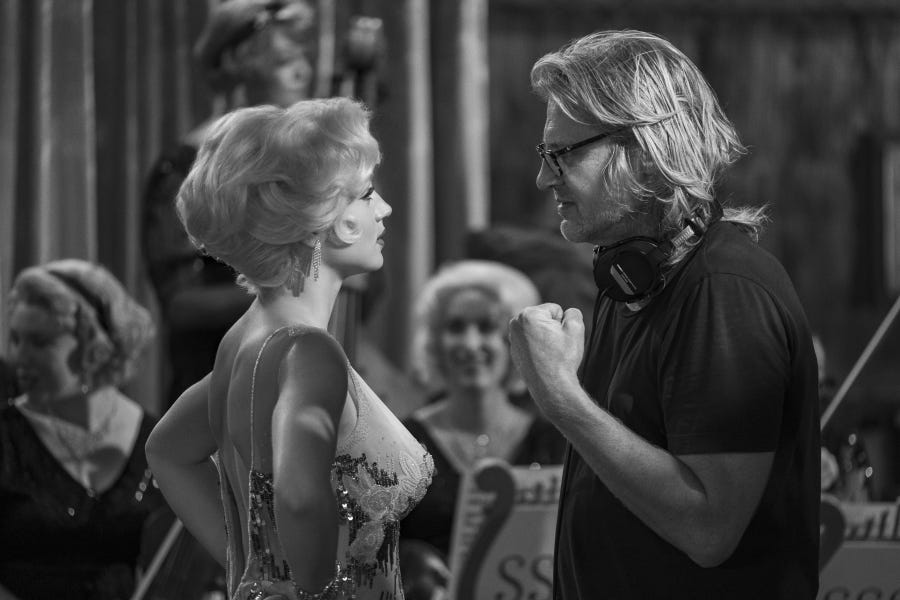Blonde, the new Netflix Marilyn Monroe film, belongs to what one might term the Oliver Stone school of biopics—interesting at times, but absolutely unhinged in its relationship to reality. A Kennedy hit squad forcibly aborting a JFK/Monroe love child and a bisexual throuple involving Monroe and the sons of two movie stars are just two of the bizarre additions to Monroe’s life that director Andrew Dominik made in his film. The truth is that Monroe’s life didn’t need spicing up. There’s plenty of trauma, sadness, and psychological exploration to be had, all without the attempts at shock value that Dominik crassly shoves into Blonde.
Take Monroe’s adolescence, which Dominik all but skips, save for seeing her separated from her mentally unwell mother. Monroe hopped around foster homes growing up, was sexually abused as a child, and married an older man at the age of 16. That these details were left out of the film is baffling—the entire point of Blonde is to show how Monroe spent her life seeking security and approval from parental figures. Exchanging these real occurrences with contrived and occasionally sexualized plot points makes no sense. Was a threesome scene more necessary to the plot than Monroe’s entire first marriage?
If Dominik was really that dedicated to playing fast and loose with the facts of Monroe’s life, he could have done so in a way that was more interesting and actually had some possible basis: Monroe is rumored to have either been asexual or a closeted lesbian. The contrast between being the world’s most famous sex symbol and privately avoiding and disliking sex either with men or altogether makes for a more interesting character study than the half thought out nonsense than Blonde serves up.
Blonde follows Monroe from childhood to her suicide in 1962, focusing on Monroe’s attempts to find a sense of value and stability from her relationships. The film is adapted from Joyce Carol Oates novel of the same name, and stars Ana de Armas as the tortured actress, with Xavier Samuel as her lover, Charlie Chaplin Jr.; Bobby Cannavale as her second husband, Joe DiMaggio; and Adrien Brody as her third husband, Arthur Miller. Much of the film’s odd narrative decisions stem from Oates novel—why Dominik felt fealty to the falsehoods in the book was more important than reality is unclear, but it certainly doesn’t work.
One area of genuine interest: Blonde’s handling of abortion. This part of the movie is a rarity in Hollywood, depicting the brutality of the act in unflinching fashion. Monroe is left traumatized by her abortions, something that reflects the lived experience of many women but that is rarely represented in cinema. To show that abortion isn’t a universally positive experience invites the criticism of extreme sects of society who believe abortion must always be portrayed in glowing terms, and who, sure enough, have already criticized Blonde for its realistically graphic portrayal of abortion. (Which is, perhaps, a half thought out criticism: saying that realistic depiction represents an argument against abortion is perhaps not the strong take they think it is.)
But from there, Blonde reverts to the formula of attempting to shock or appall or titillate with little apparent reason. Heavy-handedness reigns supreme, with visual sexual metaphors that could have been written by a middle schooler, a recurring voiceover narration from Marilyn’s unseen alleged father, and a soon-to-be-infamous CGI talking fetus who asks Marilyn why she killed her baby.
What positive aspects there are in Blonde—de Armas’ portrayal of Monroe is inspired, and Brody does phenomenal work as Arthur Miller—get drowned out by the outré story decisions, the stilted dialogue, and the inexplicable decision to feature a synth, 1980s sci-fi sounding score. Blonde shows that Marilyn Monroe deserved better in her life. She deserves better now, too.







Please note that we at The Dispatch hold ourselves, our work, and our commenters to a higher standard than other places on the internet. We welcome comments that foster genuine debate or discussion—including comments critical of us or our work—but responses that include ad hominem attacks on fellow Dispatch members or are intended to stoke fear and anger may be moderated.
With your membership, you only have the ability to comment on The Morning Dispatch articles. Consider upgrading to join the conversation everywhere.